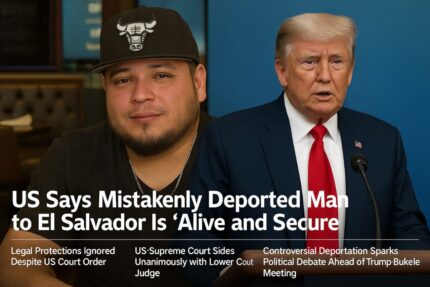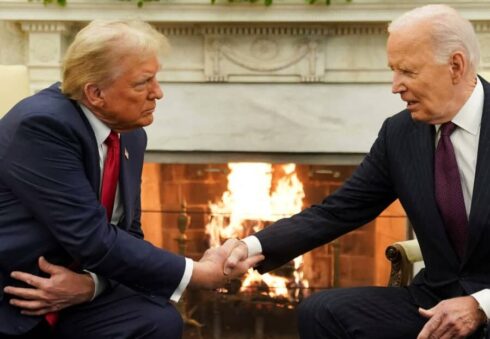The United States government has confirmed that Kilmar Abrego Garcia, the man mistakenly deported to El Salvador, is “alive and secure,” according to an official statement submitted in court. Michael Kozak, a US senior official at the State Department, relayed this assurance to Maryland District Judge Paula Xinis, citing reports from the U.S. Embassy in San Salvador.
Garcia, 29, is currently being held in the notorious Terrorism Confinement Center (Cecot), a maximum-security mega-prison known for housing some of Central America’s most dangerous inmates. The revelation comes days after the U.S. Supreme Court ordered the Trump administration to facilitate his return to the United States, following a contentious legal battle over the circumstances surrounding his deportation.
Legal Protections Ignored Despite US Court Order
Garcia, a Salvadoran national, had been granted legal protection from deportation by an immigration judge in 2019 after federal authorities detained him in Maryland. The court had acknowledged the risk of persecution he could face from gangs if returned to El Salvador. However, in what the U.S. government has since admitted was an “administrative error,” Garcia was deported last month.
Despite the judicial safeguards in place, Garcia was one of 261 individuals—comprising 238 Venezuelans and 23 Salvadorans—deported under a bilateral arrangement between the Trump administration and El Salvador. Legal advocates argue that Garcia’s deportation violated a standing court order and exposed him to significant personal danger, a point emphasized in filings that accused the government of trying to “delay, obfuscate and flout court orders, while a man’s life and safety is at risk.”
US Supreme Court Sides Unanimously with Lower Court Judge
In a rare unanimous decision, the U.S. Supreme Court this week backed Judge Xinis’ order compelling the Trump administration to assist in Garcia’s return. The ruling was seen as a rebuke to government lawyers who contended that Judge Xinis had overstepped her authority. Instead, the Court emphasized the importance of judicial compliance and accountability in matters involving human rights and federal oversight.
Judge Xinis responded by directing the administration to provide daily updates on their efforts to return Garcia to the United States. Her ruling has intensified scrutiny over the deportation policies of the Trump administration, particularly its handling of asylum seekers and immigrants who have been granted legal reprieve.
Controversial Deportation Sparks Political Debate Ahead of Trump-Bukele Meeting
The timing of the case has added political friction ahead of a planned meeting between former President Donald Trump and Salvadoran President Nayib Bukele at the White House on Monday. Trump, who continues to refer to deportees as “barbarians” and “violent alien enemies of the World,” has publicly thanked Bukele for accepting the deportees.
In a post on Truth Social, Trump stated, “Their future is up to President B and his Government. They will never threaten or menace our Citizens again!” Yet, critics argue that lumping individuals like Garcia—who was protected under U.S. immigration law—into this category undermines justice and due process. Advocates fear this rhetoric risks further stigmatizing vulnerable migrants while emboldening hardline immigration enforcement.
Ongoing Legal and Human Rights Implications
The saga surrounding Garcia’s mistaken deportation has cast a harsh spotlight on the broader consequences of aggressive deportation tactics and administrative missteps. While the government insists Garcia has gang affiliations—specifically with MS-13—his legal team has denied those claims, insisting he has no criminal record and was wrongly profiled.
Garcia’s case could set a significant legal precedent regarding the limits of executive immigration authority and the protections afforded by the judiciary. Immigration experts warn that unless meaningful safeguards are implemented, other vulnerable individuals could find themselves similarly at risk, especially amid increasingly politicized immigration enforcement.
As the Biden administration navigates pressure to uphold judicial decisions while maintaining diplomatic ties with El Salvador, the outcome of Garcia’s case will likely influence future immigration policy and the extent to which the executive branch respects court-imposed limits.














